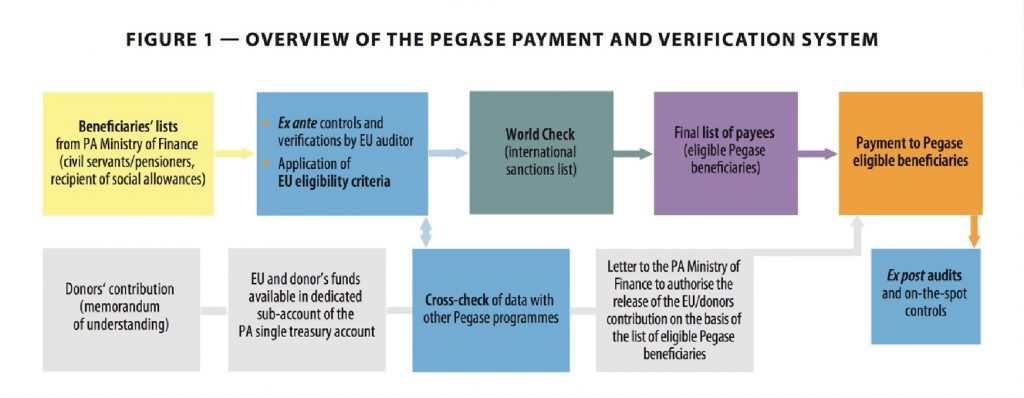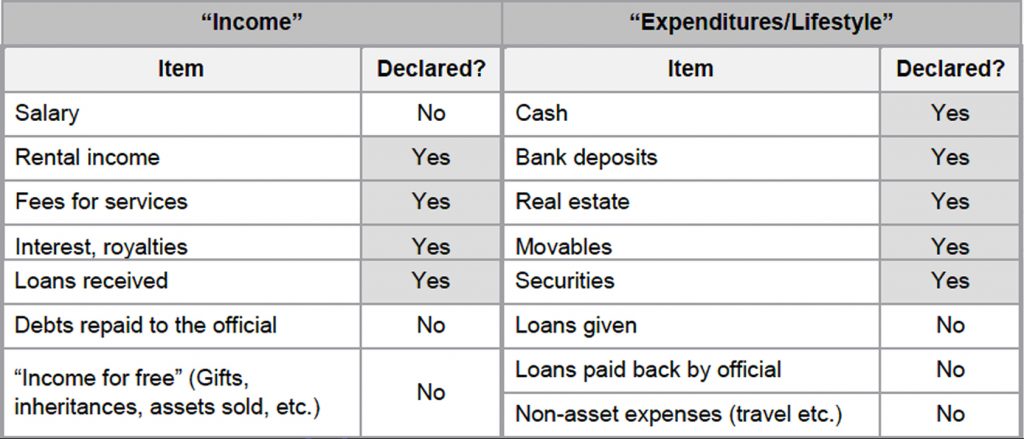Standing up for European Principles On Human RightsTuesday 03/10/2017
Now More Than Ever:
Summary: Decision Action Still Needed
Four years ago, an audit by the European Court of Auditors (ECA) noted serious irregularities in funds distributed to the Palestinian Authority, especially aid grants remitted to ‘workers’ in Gaza who could not show evidence of employment. Transparency International reported widespread irregularities and likely corruption throughout the payment system in a 2016 report.
Overall, while some modest improvements have been noted, decisive EU action to mandate adequate accounting checks and, where necessary, impose appropriate penalties for non-compliance remains essential.
The 2012 ECA Report on Aid to Workers in Gaza
In late 2012, the European Court of Auditors conducted an on-site study in Israel to verify the aid distribution mechanism from the EU through PEGASE to the Palestinian Authority (PA). PEGASE describes itself as:
“… the European Union’s mechanism to support the Palestinian people through implementation of … the PA’s own Single Treasury Account (STA) or via direct payments to eligible companies and individuals in full transparency, co-operation and agreement with the PA.”
This illustration from the 2013 ECA report depicted the steps to be carried out by the PEGASE process:

In a key finding, the ECA report stated that:
“Pegase DFS has contributed to essential public services, but the audit found that in Gaza a considerable number of civil servants were being paid without going to work and providing a public service due to the political situation in Gaza. The Commission and the EEAS have not sufficiently addressed this problem.”
Consequently, the ECA advised the EU to forge an agreement with the PA to cease civil servant payments in Gaza and transfer these to the West Bank, as well as to “apply conditionality to the future Pegase DFS, specifically by linking it to concrete progress by the PA on civil service reform.”
The EU Commission agreed to the latter recommendation on conditionality. However, the EU did not then accept the proposal to sever payments to civil service workers in Gaza. Nevertheless, in February 2017, the decision was taken to shift funding of Gaza public employees in favor of direct aid to poor families. The Communication officer of the EU Commission, Shadi Othman, positioned this to the Palestinian media as a minor change in procedure. In a separate interview, Othman opposed the conditionality provisions of the ECA recommendations as a form of ‘blackmail’ against the Palestinian people.
The 2016 Transparency International Report
On Illicit Enrichment of Palestinian Public Officials
Transparency International is a global NGO leading the fight against governmental corruption. Sweden sponsored, though it did not necessarily concur with the conclusions reached in their report titled “Asset Declarations in Palestine: Illicit Enrichment and Conflicts of Interest of Public Officials.”
The report observed that more than US$160 billon is believed to have been stolen by regime officials over the years in Egypt, Libya, Tunisia and Yemen alone. Subsequently, international standards for declaring and tracking asset accumulation by public officials have been defined and, sometimes, adopted by affected countries. This has included organizations like the Palestinian Authority. Even so, the report contains scathing criticism of the gulf between formal adoption and on-the-ground practices.
Not a single standard of the ten outlined below have been implemented effectively – some not at all – by the PA:
- Creation of a legal basis for detecting illegal enrichment and conflicts of interest (a law passed in 2002 was later revised to exclude many government officials, including judges).
- Declaration of all income, gifts, loans and sales of property by those entering public service (the current regulations are ambiguous, creating the potential for hiding illicit funds in non-reportable categories).
- All officials should be required to declare assets (judiciary officials, at high risk of illicit activities, are excluded; family members are included but do not, in practice, declare).
- Asset declarations must be submitted when assuming office (no statistics on compliance, but it is believed the majority of required declarations are never submitted; the provision seems to be “toothless”).
- Asset declaration must be verified (no law in place, no evidence that even a single case has been brought against an official in non-compliance).
- An oversight body will conduct asset verification, with access to public databases (created, without dedicated staff, training or procedures).
- Formal operation will occur between the oversight body and prosecution, police and finance intelligence (not established).
- Asset declarations will be visible and accessible to the public (not implemented).
This table illustrates the categorization of assets subject to declaration, showing which items must be declared. As mentioned above, some categories are ambiguous and can be flexibly ‘interpreted’ by those making asset declarations:

The 2016 Transparency International report concluded by stating that “Palestine has fallen behind international standards on asset declaration” and by offering a series of reform proposals.
Conclusion: The More Things Change …
A proverbial French expression notes that ‘the more things change, the more they remain the same.’ Regrettably, this applies to EU funding of PA activities. While we commend the efforts of the ECA and Transparency International to shed continued light on the lack of substantive accountability by the PA, it falls to the EU to take the decisive action required for permanent reform.
Conditionality – the formal linkage between change in PA behavior and aid distribution to Palestinians – must include measurable criteria for each standard of financial accountability. Enforcement, including sanctions where needed, must be applied without reference to PA complaints. The EU can, through this method alone, offer genuine help to the Palestinian people who are the hoped-for recipients of financial aid that today, as in the past, too often finds its ways into the private bank accounts of a corrupt political and legal class.